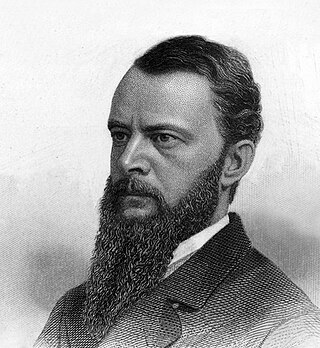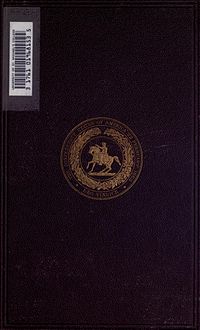
The American Civil War was a civil war in the United States between the Union and the Confederacy, which had been formed by states that had seceded from the Union. The central cause of the war was the dispute over whether slavery would be permitted to expand into the western territories, leading to more slave states, or be prevented from doing so, which many believed would place slavery on a course of ultimate extinction.

The Confederate States of America (CSA), commonly referred to as the Confederate States (C.S.), the Confederacy, or the South, was an unrecognized breakaway republic in the Southern United States that existed from February 8, 1861, to May 9, 1865. The Confederacy comprised eleven U.S. states that declared secession and warred against the United States during the American Civil War. The states were South Carolina, Mississippi, Florida, Alabama, Georgia, Louisiana, Texas, Virginia, Arkansas, Tennessee, and North Carolina.

Jefferson F. Davis was an American politician who served as the first and only president of the Confederate States from 1861 to 1865. He represented Mississippi in the United States Senate and the House of Representatives as a member of the Democratic Party before the American Civil War. He was the United States Secretary of War from 1853 to 1857.

Judah Philip Benjamin, QC was an American lawyer and politician. He was a United States senator from Louisiana, a Cabinet officer of the Confederate States and, after his escape to the United Kingdom at the end of the American Civil War, an English barrister. Benjamin was the first Jew to hold a Cabinet position in North America and the first to be elected to the United States Senate who had not renounced his faith.

Varina Anne Banks Davis was the only First Lady of the Confederate States of America, and the longtime second wife of President Jefferson Davis. She moved to the Presidential Mansion in Richmond, Virginia, in mid-1861, and lived there for the remainder of the Civil War. Born and raised in the South and educated in Philadelphia, she had family on both sides of the conflict and unconventional views for a woman in her public role. She did not support the Confederacy's position on slavery, and was ambivalent about the war.

Historians who address the origins of the American Civil War agree that the preservation of the institution of slavery was the principal aim of the 11 Southern states that declared their secession from the United States and united to form the Confederate States of America. However, while historians in the 21st century agree on the centrality of the conflict over slavery—it was not just "a cause" of the war but "the cause" according to Civil War historian Chris Mackowski—they disagree sharply on which aspects of this conflict were most important, and on the North’s reasons for refusing to allow the Southern states to secede. Proponents of the pseudo-historical Lost Cause ideology have denied that slavery was the principal cause of the secession, a view that has been disproven by the overwhelming historical evidence against it, notably the seceding states' own secession documents.

In the context of the American Civil War (1861–65), the border states were slave states that did not secede from the Union. They were Delaware, Maryland, Kentucky, and Missouri, and after 1863, the new state of West Virginia. To their north they bordered free states of the Union, and all but Delaware bordered slave states of the Confederacy to their south.

In the United States the period 1849 and 1865 was dominated by the tensions that led to the American Civil War between North and South, and the bloody fighting in 1861-1865 that produced Northern victory in the war and ended slavery. At the same time industrialization and the transportation revolution changed the economics of the Northern United States and the Western United States. Heavy immigration from Western Europe shifted the center of population further to the North.

Neo-Confederates are groups and individuals who portray the Confederate States of America and its actions during the American Civil War in a positive light. The League of the South, the Sons of Confederate Veterans and other neo-Confederate organizations continue to defend the secession of the former Confederate States.

The Lost Cause of the Confederacy is an American pseudohistorical and historical negationist myth that claims the cause of the Confederate States during the American Civil War was just, heroic, and not centered on slavery. First enunciated in 1866, it has continued to influence racism, gender roles, and religious attitudes in the Southern United States into the 21st century. Historians have dismantled many parts of the Lost Cause mythos.
The most common name for the American Civil War in modern American usage is simply "The Civil War". Although rarely used during the war, the term "War Between the States" became widespread afterward in the Southern United States. During and immediately after the war, Northern historians often used the terms "War of the Rebellion" and "Great Rebellion", and the Confederate term was "War for Southern Independence", which regained some currency in the 20th century but has again fallen out of use. The name "Slaveholders' Rebellion" was used by Frederick Douglass and appears in newspaper articles. "Freedom War" is used to celebrate the war's effect of ending slavery.

The Hampton Roads Conference was a peace conference held between the United States and representatives of the unrecognized breakaway Confederate States on February 3, 1865, aboard the steamboat River Queen in Hampton Roads, Virginia, to discuss terms to end the American Civil War. President Abraham Lincoln and Secretary of State William H. Seward, representing the Union, met with three commissioners from the Confederacy: Vice President Alexander H. Stephens, Senator Robert M. T. Hunter, and Assistant Secretary of War John A. Campbell.
"King Cotton" is a slogan that summarized the strategy used before the American Civil War by secessionists in the southern states to claim the feasibility of secession and to prove there was no need to fear a war with the northern states. The theory held that control over cotton exports would make a proposed independent Confederacy economically prosperous, would ruin the textile industry of New England, and—most importantly—would force the United Kingdom and perhaps France to support the Confederacy militarily because their industrial economies depended on Southern cotton.

The Cornerstone Speech, also known as the Cornerstone Address, was an oration given by Alexander H. Stephens, acting Vice President of the Confederate States of America, at the Athenaeum in Savannah, Georgia, on March 21, 1861.

Edward Alfred Pollard was an American author, journalist, and Confederate sympathizer during the American Civil War who wrote several books on the causes and events of the war, notably The Lost Cause: A New Southern History of the War of the Confederates (1866) and The Lost Cause Regained (1868), wherein Pollard originated the long-standing pseudo-historical ideology of the Lost Cause of the Confederacy.

During the American Civil War (1861–1865), Maryland, a slave state, was one of the border states, straddling the South and North. Despite some popular support for the cause of the Confederate States of America, Maryland did not secede during the Civil War. Governor Thomas H. Hicks, despite his early sympathies for the South, helped prevent the state from seceding.
Historiography examines how the past has been viewed or interpreted. Historiographic issues about the American Civil War include the name of the war, the origins or causes of the war, and President Abraham Lincoln's views and goals regarding slavery.

William Charles "Jack" Davis is an American historian who was a professor of history at Virginia Tech and the former director of programs at that school's Virginia Center for Civil War Studies. Specializing in the American Civil War, Davis has written more than 40 books on that subject and other aspects of early southern U.S. history, such as the Texas Revolution. He is the only three-time winner of the Jefferson Davis Prize for Confederate history and was awarded the Jules and Frances Landry Award for Southern History. His book Lone Star Rising has been called "the best one-volume history of the Texas revolution yet written".

Confederate colonies were made up of Confederate refugees who were displaced or fled their homes during or immediately after the American Civil War. They migrated to various countries, but especially Brazil, where slavery remained legal, and to a lesser extent Mexico and British Honduras.
The U.S. state of Louisiana declared that it had seceded from the United States on January 26, 1861. It then announced that it had joined the Confederate States (C.S.); Louisiana was the sixth slave state to declare that it had seceded from the U.S. and joined the C.S.
















